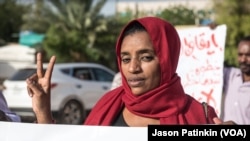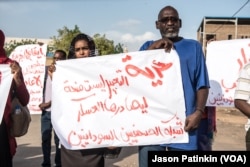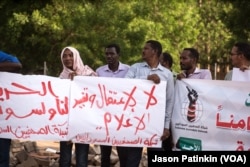Sudanese security forces halted a protest by journalists in Khartoum Sunday over authorities’ decision to shut down the local office of Al-Jazeera television.
The shutdown came hours before troops opened fire in Khartoum clear a two-month sit-in of protesters demanding the military hand power to a civilian authority, leaving at least nine people dead.
Just seconds after Sudanese journalists unfurled banners demanding freedom of the press, a pickup truck of troops with a mounted machine gun arrived to shut down the protest.
Despite the rally taking place on a public street, an officer with the paramilitary Rapid Support Forces (RSF) said the area was a military zone and that filming was prohibited.
The officer threatened to arrest the journalists if they did not leave the area and singled out a foreign reporter who was covering the rally as one who would be placed in handcuffs.
Shamaya Al Noor, a columnist for Al Tayar Newspaper, said it was impossible to convince the RSF to allow the protest.
"With the RSF, there's no negotiations, there's no common language with these forces. If you try and speak to them, they won't understand," she said. "So, wisdom dictates that you just leave the place because they might just attack you immediately."
The RSF, which has been accused of leading attacks on protesters, are showing that they are the ones in control of Khartoum, says Noor.
"Even the way their soldiers speak, they're trying to tell us that they're in control," she said. "They will (do the) banning of things, (they will) give permissions," said Noor.
"Basically, they're trying to say, ‘We are the government.’”
Reminiscent of Bashir
The RSF’s actions, says Noor, remind her of the way former President Omar al-Bashir ran things – by force.
"People are still breathing in the revolution, and the military council has quickly oppressed what little freedom we got from the toppling of Omar al-Bashir," she said. "People must be ready to repel any attempts from the military council to oppress the journalists."
The military ousted Bashir in April but has been beset since by thousands of protesters at a massive sit,-in demanding they hand power to civilians.
After the Rapid Support Forces stopped their protest Sunday, the journalists moved it behind the sit-in’s makeshift barricades, where the RSF has not been allowed to enter.
The journalists organized the protest in response to the military last week ordering the closing of Qatari state broadcaster Al Jazeera’s Khartoum office without a stated reason.
Sudan's military council is backed by the United Arab Emirates and Saudi Arabia, both bitter rivals of nearby Qatar.
But Mohammed Abdulaziz, a reporter for the Sudani newspaper, said in order for Sudan to be a democracy, all press organizations must be allowed to operate.
"We are concerned about freedom, not what's the name of the station, what’s the name of the media, or whatever," he said. "The most important issue is the freedom if you want to establish a modern and democratic movement or community ... Everything is freedom."
Adil Ibrahim of the Sudanese Journalists Network, which is part of an alliance of professional organizations that has led the demonstrations against military rule, said the closure of Al Jazeera was one of many recent incidents against the press in Sudan's capital.
"The last three weeks in Khartoum dropped down in the freedom of speech and journalist rights," he said. "We think it is a crime against their rights to work, their rights of freedom of speech, it is a very very bad decision ... We think right of speech is not covering just the journalists, it's the right of the people of the republic."
Ibrahim said that in recent weeks, Sudanese radio stations and newspapers have been censored on certain topics such as corruption and the Transitional Military Council that replaced Bashir.
He said the media clampdown appeared to be a prelude to the RSF’s violent attacks on the sit-in as talks between the military and protest leaders have stalled.
The military on Thursday declared the protest in central Khartoum a threat to public safety and early Monday morning the RSF raided the protest site, with many casualties reported.
With violence increasing, and freedom of the press under attack, many Sudanese fear what few freedoms they have gained from their revolution are at risk of slipping away.






